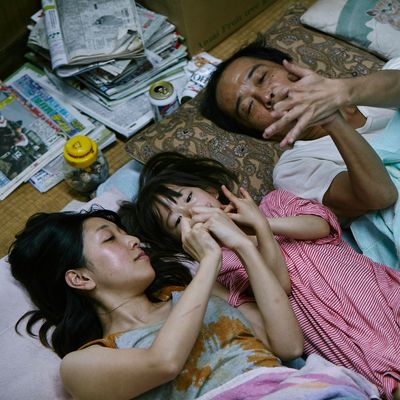
Hirokazu Kore-Eda tends to stay at eye level with his characters. It’s what makes his patient dramas, which often concern families and the subtle dynamics that hold them together and divide them, so involving. So when his camera flies high up above the Sumidas’ tiny hovel midway through Shoplifters, on a buzzing summer night as fireworks pop in the distance, it’s striking in context. What’s more, in the midst of an otherwise lifeless Tokyo suburb, squeezed in between drab apartment buildings and the cold glow of energy-efficient street lamps, the Sumidas’ cramped house, spilling over with people young and old, is the one bright spot of light.
But Kore-Eda isn’t romanticizing his characters’ poverty, or suggesting that it puts them more in touch with some abstract, sentimental idea of “what really matters.” The film meanders pleasantly through its picaresque episodes of odd jobs and familial bonds and many a five-finger discount, and two-thirds of the way in it feels — not unpleasantly at all — like the chill, lived-in kind of fare the director seemingly effortlessly excels at. But when the script rounds its corner and the family’s true nature comes into the light — not one single dramatic revelation but a cascade of them — it becomes clear that Shoplifters has much more to say about the active choice of being a family member — especially a parent — in a way that goes far beyond the Sumidas’ particular situation.
Osamu (Lily Franky), Nobuyo (Sakura Ando), Aki (Mayu Matsuoka), and Shota (Jyo Kairi) all live under the roof of their grandma Hatsue (Kore-Eda stalwart and muse Kirin Kiki), living off her pension and the menial labor jobs Osamu and Nobuyo hold down. To make ends meet, the family shoplifts nearly all of their food, with young Shota and patriarch Osamu bringing home most of the ill-begotten bacon. (“If it’s in a store, it doesn’t belong to anyone yet,” reasons Osamu later on.) One winter’s night, while coming home from the day’s errands, they spot a young girl (Miyu Sasaki), left outside on her parents’ patio. It’s not the first time they’ve seen her there, and fearing for her safety in the cold, they take her home with them. One wonders if a little bit of that shoplifting logic is at play, and how much stealing and saving are interchangeable ideas for the Sumidas.
The family’s resources are stretched as it is, but when it becomes clear that the girl is being abused by her parents, they decide to informally adopt her. They give her a haircut and a new name — Lin — but none of it feels as sinister as that description sounds, even though they are technically kidnappers. As Nobuyo wraps her arms around her, almost defiantly, it’s as if she’s willing her affection to be a kind of vengeance against the cruelty and negligence of the world. “If they really love you,” she tells Lin, tears welling up in her eyes, “they do this.”
So begins a year in the life of this unconventional family and their newest member. Kore-Eda, even more so than his last film After The Storm, paints a picture of Japanese poverty that rarely gets airtime overseas. The setting is hardly recognizable to a foreign audience as Tokyo, far from the city’s identifiable centers of commerce. Kore-Eda takes his time exploring the pockets of his ensemble’s lives as individuals and as family members, from Aki’s alienating job as a peep show worker (“I have a second name, too,” she reassures Yuri/Lin), to Grandma’s strangely dependent relationship with the children of her ex-husband and the wife he left her for. Every scene adds another onion-skinlike layer, adding density and mass so slowly that you hardly notice the emotional weight of it all until it is suddenly overwhelming.
This kind of subtle richness is not new for Kore-Eda, though it’s as satisfying here as it’s ever been. But its development runs parallel to the slowly dawning realization that all may not be as it appears in the family, and that their devotion to each other and exile on the margins of society are related, and under the pressure of external factors. Meanwhile, the hunt for Yuri becomes a national news story, but from our perspective, it seems trivial next to the fact that, by all appearances, Osamu and Nobuyo have given her a better life. When all that finally unravels, it feels as though the film flips around 180 degrees — no less empathetic than before, but more clear-eyed.
It’s tempting to call material like this sentimental, but Shoplifters’ matter-of-factness — even nihilism at times — about death and loss is bracing — and ultimately what makes it so heartbreaking. At the end of the road, Nobuyo tries to reckon with the fact that the life she’s built for herself was always untenable, and I won’t soon forget Ando, rubbing her head almost compulsively, her devastation boiling down to one repeated, wounded gesture. Shoplifters is a sneakily ambitious tale for Kore-Eda, and feels like one of the most consequential films he’s made in a very long time.
Shoplifters was nominated for an Oscar in 2019 for Best Foreign Language Film.

